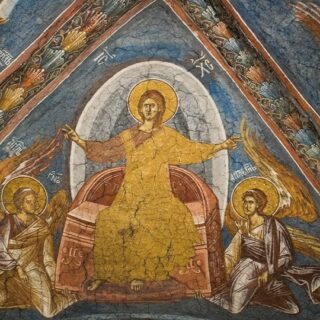
How to explain the following passage from the New Testament as it appears in the Jerusalem Bible: “If it is hard for a good man to be saved, what will happen to the wicked man and to sinners?” (1 Peter 4:18)?
The passage which you mention is interesting on a number of different levels. First, in its context.
The Larger Context
The first letter of Peter speaks of the “Great Inheritance” (1:1-5) which we Christians receive in our rebirth into the new life in Christ and it focuses on that new life. The locus where that life is lived is the Church (2:1-10). The letter shows that Christians must bring to bear upon various aspects of existence, this new life. Topics such as Christian citizenship, living in society, work, the example of the good Christian life, women’s adornment, marriage, Christian virtues, and suffering for righteousness’ sake (2:11-3:22) are discussed. Chapter 4 continues the letter’s directions on Christian behavior, especially within the community of the Church (4:1-12). The balance of chapter 4 talks about the coming persecution of the Christians, and how to respond to this persecution (4:12-19). The 5th and final chapter addresses the spiritual leaders of the community and the people giving them direction and courage as they are tried by persecution (5:1-14).
The Immediate Context
So verse 18 is part of the letter which is urging believers to meet the forthcoming persecution by having a full trust in God. “If you are reproached for the name of Christ, you are blessed, because the spirit of glory and of God rests upon you” (v.14). … “Let those who suffer according to God’s will do right and entrust their souls to a faithful Creator” (v.19). Immediately preceding verse 18, Peter announces that the “time has come for judgment to begin.” And he says that it will begin with the Church, that is, the Christians who make up “the household of God.”
Verse 18
This teaching, that the judgment of God will come first to the believer and then to the unbelievers is surprising. To the expected response “why us?,” Peter responds by asserting that the judgment on the Christian who does the will of God will be mild and approving, in comparison to those who do not believe, and who do not seek to do the will of God in their lives. In other words, they are going to be a lot worse off than we will be, if we do the kinds of things Peter is telling us to do all throughout this letter. Verse 17 says, “For the time has come for judgment to begin with the household of God; and if it begins with us, what will be the end of those who do not obey the Gospel of God?” Well, it is clear that the answer is that it will not be good at all. In comparison, when Christ comes to “judge the living and the dead,” those who have believed, who have sought to live the godly life and to grow in it will be judged favorably.
Verse 18, which is quoted from one of the modern translations, The Jerusalem Bible, is translated in the Revised Standard Version as follows:
“If the righteous man is scarcely saved where will the impious and sinner appear?”
Clearly this is Peter’s way of encouraging the Christian who is struggling to live the Christian life in the face of the persecution to come with the promise, that God will in fact save him and bring him into His Kingdom. The irreverent and the sinful people who ignore God’s commandments, will, clearly, be condemned and will not share in the life of God’s eternal Kingdom. They won’t appear there, but in Hell.
The directive which follows from all this is found in verse 19. The Christian must endure even when he or she is persecuted for being a Christian (“who suffers according to God’s will”). How is this to be done? Two things are required. The first is to continue, even when persecuted, to “do right.” And the second, is to “entrust their souls to a faithful Creator.” The Greek word translated by the English “entrust” is “paratithesthosan’ which literally means “to place themselves with or next to someone or something.” In ancient Greece it was used in a specific technical sense when someone deposited money with a trusted friend. So in a sense, Peter is saying, Christians should entrust their whole lives to God totally, just as a person might entrust his or her whole material wealth with confidence in some strong and inviolate depository.
The advice given to those first Christians on the eve of the Roman persecution is no less valuable to Christians today throughout the world, where the persecution of Christianity continues unabated: the Middle East, Turkey and even in a veiled way in the so-called “Christian” nations of the west. He says to us, too: “Continue to live according to My will, and trust Me completely.”
A Quotation Which Is Not A Quotation
If you noticed, verse 18 has a set of quotation marks around it. It is a quotation of Proverbs 11:31. However, if you look it up in the usual English translations of the Old Testament (which are made from the Hebrew text of today) you will see that it does not say the same thing! For instance, the Revised Standard Version reads:
“If the righteous is requited on earth,
how much more the wicked and the sinner!”
The dictionary defines “requite” as meaning “to make re-payment or return for.” So the Hebrew proverb says in effect, “good people will get good things back in this life, so can you imagine how many bad things evil and sinners will get back in this life.” Certainly this is not the same meaning as verse 18 in 1 Peter! Peter is talking about the righteous person in the context of eternal judgment, not an earthly moral balance. Persecution is precisely “bad things” coming to good people in this life!
The Importance of the Greek Old Testament
Did Peter make the verse up? Did he misquote the Old Testament to Testament text, the first translation ever made of the Hebrew, known as make his point? No, not at all. What he quoted was the Greek Old the Septuigint. Like the four Evangelists, Peter quotes the Old Testament in its Greek Septuigint form. What is Proverbs 11:31 in the Septuigint?
Here is the Brenton translation, published by Samuel Bagster:
“If the righteous scarcely be saved, where shall the ungodly and the sinner appear?”
This is a concrete example of the fact that the New Testament writers (who wrote directly in the Greek language) used the Septuigint as their “official” text. The Orthodox Church continues to recognize the Septuigint as its official Old Testament text. The Septuigint is a valuable witness to the way the Hebrew text was understood during the period immediately preceding the coming of Christ by the Jews themselves, since it was Jews who translated the Hebrew text into Greek for their own use.





